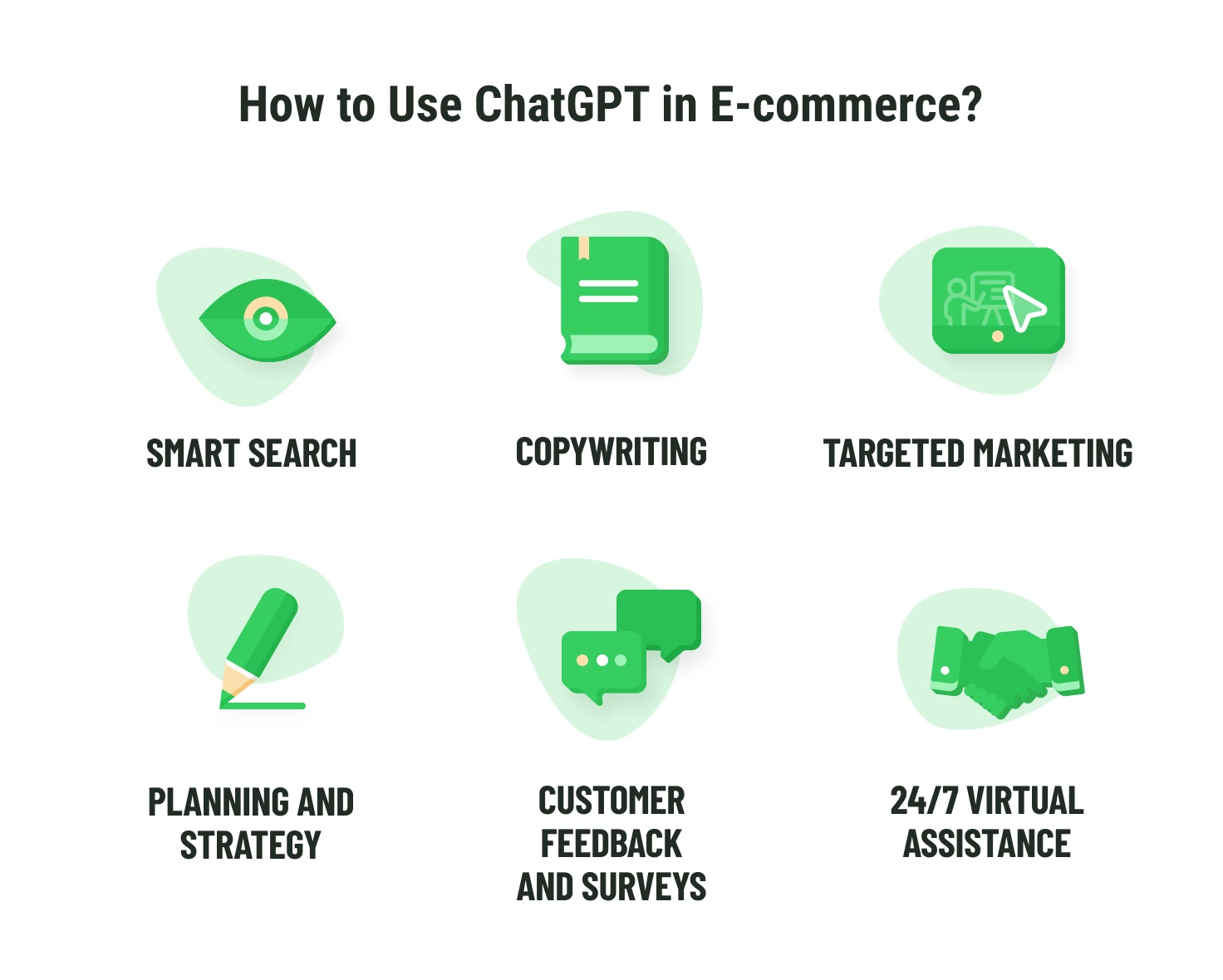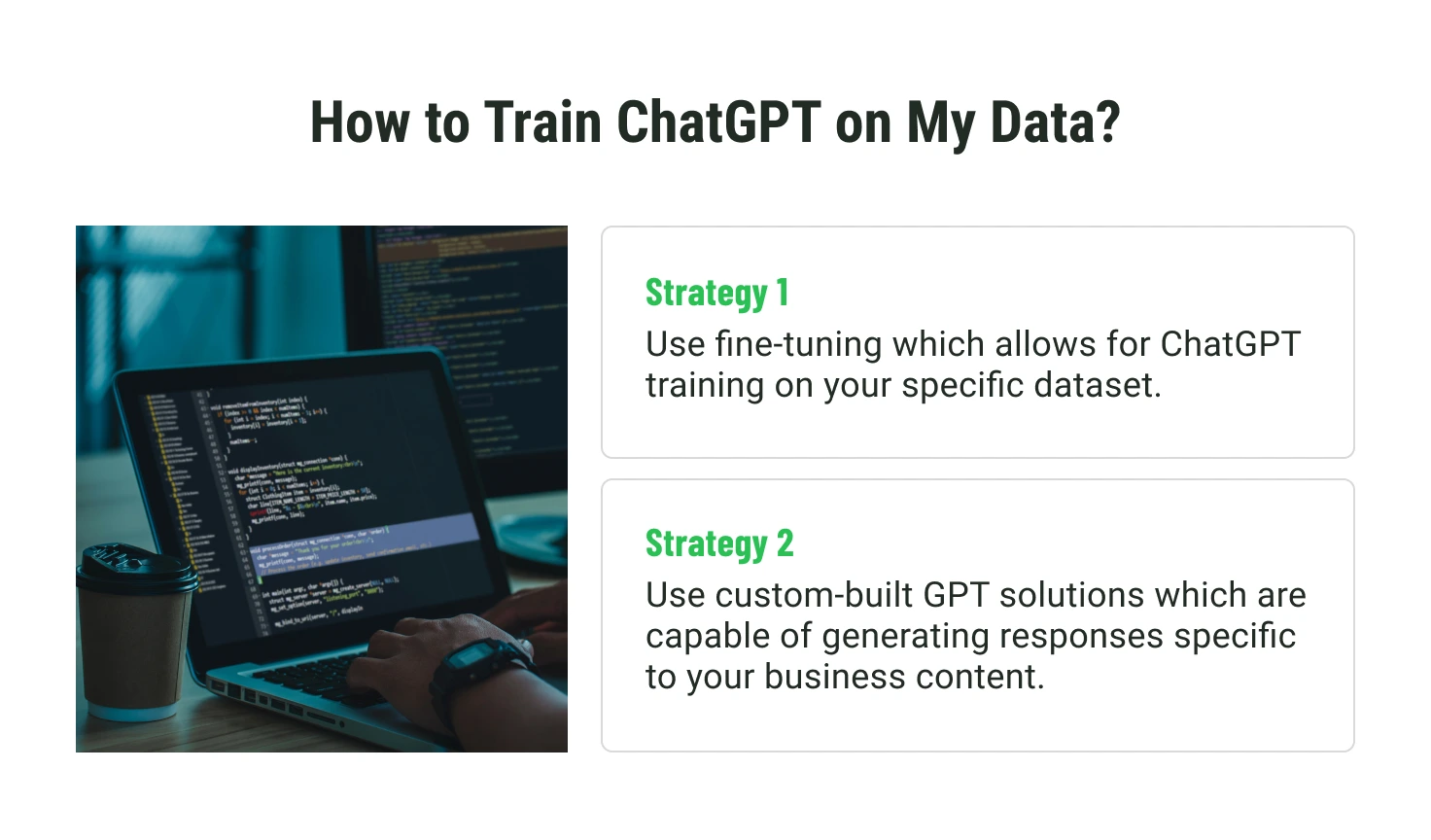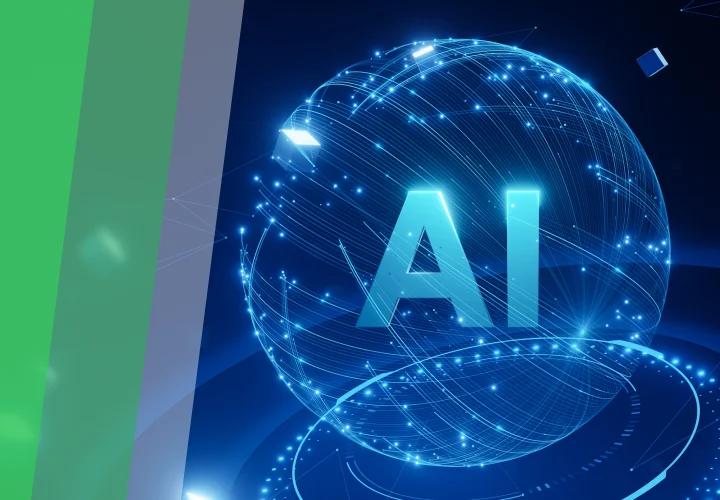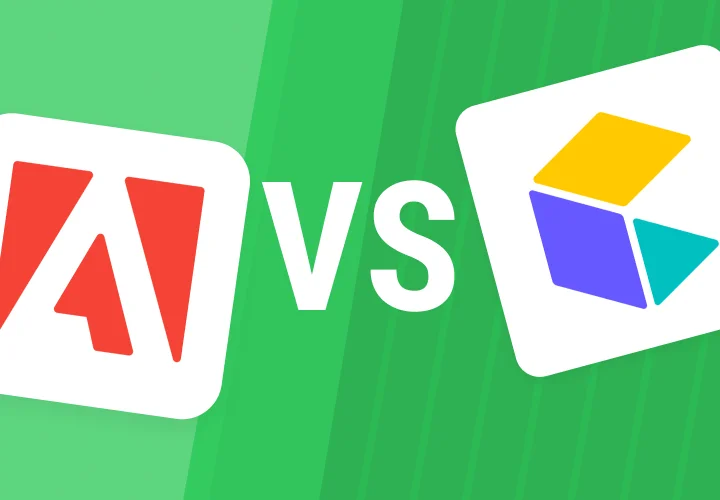How to Use ChatGPT in E-commerce: Q&A for Business Leaders
Table of contents
The recent astonishing advancements in artificial intelligence (AI), particularly exemplified by ChatGPT, have sent shockwaves through every industry. ChatGPT has already gained massive popularity, with over 100 million users adopting it within its initial two months, appreciating its impact on their studies, work, and leisure activities.
However, in this article, we will explore how businesses can utilize ChatGPT to enhance their operations, specifically focusing on its applications in E-commerce. Keep reading to learn how you can open up new business opportunities by integrating ChatGPT into your company’s workflows.
What Is ChatGPT?
ChatGPT, developed by OpenAI, is an AI chatbot that offers human-like conversational interactions. It utilizes large language models (LLMs) and advanced machine learning techniques to comprehend and generate natural language.

The foundation of ChatGPT lies in the GPT (Generative Pre-trained Transformer) architecture, which signifies its key characteristics.
- GPT models are generative and capable of producing contextually relevant and coherent text.
- They are pre-trained on diverse text data, enabling them to learn linguistic patterns, grammar, and context.
- Built on the Transformer architecture, GPT models leverage self-attention mechanisms and parallel processing to handle language tasks efficiently.
ChatGPT has gained immense popularity across various domains due to its versatile applications. It has been widely adopted in customer service, providing businesses with an efficient and personalized chatbot solution. Additionally, it has found utility in content generation, language translation, and even as a tool for educational purposes, empowering users in different spheres with its advanced conversational capabilities.
How to Use ChatGPT in E-commerce?
The capabilities of ChatGPT are indeed immense. Let's have a closer look at how you can use this technology when dealing with business tasks.
Smart search
ChatGPT can be effectively utilized for smart search. By integrating smart search based on GPT, users can enter specific queries like "I would like a pair of blue jeans in size M," and the solution can provide intelligent feedback. The system can understand the user's intent, interpret the search context, and accurately present relevant product options that match the user's preferences.
This enhanced search functionality enhances the user experience, facilitating seamless and efficient product discovery, and ultimately leading to improved customer satisfaction and conversion rates in E-commerce platforms.
Copywriting
According to statistics, poor product content is the result of 40% of returns, shopping cart abandonment, and lost brand trust. So, it cannot be argued that in E-commerce, effective copywriting is crucial. With ChatGPT, businesses can create engaging content that showcases their products and services and generate compelling messaging that captivates customers and establishes a strong brand presence in the online marketplace.
Targeted marketing
ChatGPT offers valuable assistance to businesses in their marketing activities. It can create engaging social media posts, compelling product category descriptions, and effective call-to-action statements. It is capable of generating captivating titles and descriptions for Google and Facebook ad campaigns. Furthermore, it can provide scripts for TikTok/Instagram ads, YouTube videos promoting products, and even draft engaging blog posts.
Customer feedback and surveys
Businesses in the product, retail, and E-commerce sectors should prioritize customer feedback to effectively assess their selling opportunities and gain a competitive advantage. By leveraging ChatGPT's capabilities, businesses can analyze customer feedback, prepare questions for surveys, and provide valuable insight, thus gathering valuable information to enhance their products, services, and overall customer experience. This feedback-driven approach enables businesses to make informed decisions, improve customer satisfaction, and stay ahead in a highly competitive market.
24/7 virtual assistance
Businesses can harness the power of Chat GPT to develop AI chatbots, virtual assistants, and help desks that excel in human-like conversations. These AI-drive technologies have the ability to provide answers, offer insightful recommendations, generate innovative ideas, and engage in extensive interactions. By the way, according to current research, by 2024, chatbots are expected to handle about 85% of customer service interactions.
By integrating chatbots into your business operations, you have the opportunity to optimize workflows, enhance efficiency, and elevate the overall experience for both internal and external users, paving the way for improved productivity and superior quality.

How to Make Money With ChatGPT?
ChatGPT offers numerous revenue-generating opportunities for businesses, though many of them manifest in the long term. While optimizing individual processes may initially have limited impact, stable digitalization with ChatGPT can lead to significant improvements over time. Businesses can enhance customer experiences, drive growth, and increase revenue through personalized recommendations, targeted marketing, and task automation.
These opportunities for growth are reinforced by data that highlight the effectiveness of AI-based solutions. 35% of what consumers purchase on Amazon comes from AI-based product recommendations, according to McKinsey. Another remarkable insight was provided by CNBC, which found that 90% of queries in finance and healthcare were handled by chatbots in 2022, resulting in cost savings between $0.50 to $0.70 per customer interaction.
So, embracing technology is a wise investment for businesses looking to enhance their bottom line and gain a competitive edge in the digital age. Moreover, the integration of technology not only improves efficiency but also frees up resources that can be redirected toward strategic initiatives and further growth.
Can I Train ChatGPT On My Data?
The answer is yes and no. OpenAI has not offered the capability for users to train ChatGPT on their specific data. However, there are alternative approaches to leverage the power of AI on your data. These are the most common ways to tell chatGPT to learn something.
Strategy 1. Fine-tuning
Fine-tuning involves taking a pre-trained model and training it further on your specific dataset or task to improve its performance in a particular domain. Fine-tuning enhances API models by providing higher quality results without relying solely on prompt design, the ability to train on more examples than fit in a prompt, and token savings due to shorter prompts and lower latency requests.
GPT-3, pre-trained on vast internet text, can intuit tasks with a few prompt examples (few-shot learning). Fine-tuning surpasses this by training on more examples, yielding superior results across numerous tasks. Once fine-tuned, examples in the prompt are no longer needed, reducing costs and enabling faster requests. The option is not free: training costs from $0,0004 to $0.03 for 1K tokens depending on the model.
Strategy 2. Data indexing
Numerous custom-built GPT solutions have emerged, capable of generating accurate responses specific to business content. These solutions leverage ChatGPT and incorporate your business data to create customized chatbots tailored to your unique needs.
For example, with such an approach, you can facilitate document searches based on data indexing using GPT embeddings, enabling the system to answer questions based on custom documents, product FAQs, and company policies. However, it is crucial to exercise caution and select reliable platforms that can be trusted with your data to ensure the security and integrity of your business information.

Summary
ChatGPT, developed by OpenAI, is an AI chatbot that uses large language models and advanced machine learning techniques to offer human-like conversational interactions. It can be effectively utilized in various ways in E-commerce, including smart search, copywriting, targeted marketing, planning, strategy development, etc.
Using ChatGPT can lead to revenue-generating opportunities through personalized recommendations, targeted marketing, and task automation. While you can't directly train ChatGPT on your data, fine-tuning and data indexing are alternative approaches to tailor AI models to your specific needs. Embracing AI like ChatGPT can be a wise investment to enhance business efficiency, customer experiences, and gain a competitive edge in the digital age.
If you want to leverage AI, chatbots, or ChatGPT for your E-commerce business, you need a reliable tech partner. Emerline can be that partner, offering a wealth of resources to bring innovation to your solutions. Book a free consultation with our experts to explore how AI can transform your E-commerce operations and drive business growth.
Published on Aug 3, 2023





